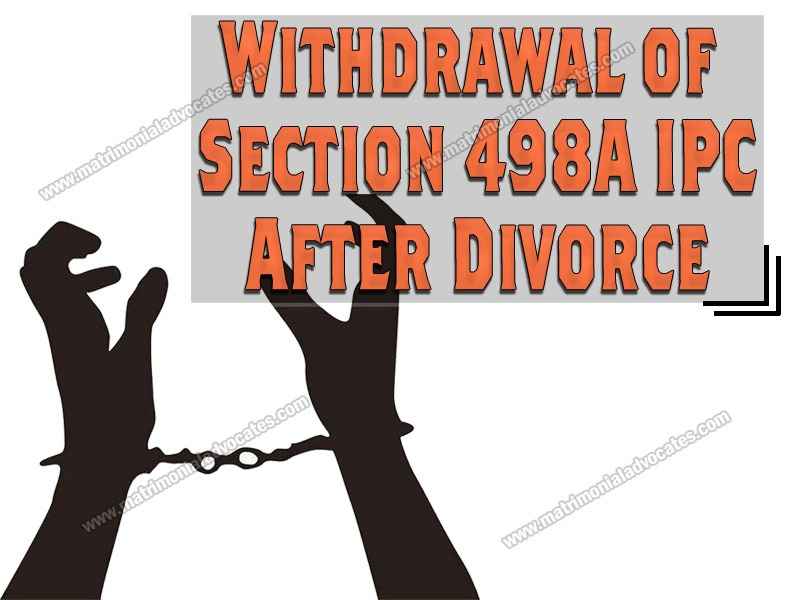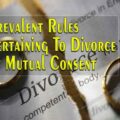
The present article is a discussion on the withdrawal of section 498A IPC after divorce.
SECTION 498A IPC
Husband or relative of husband of a woman subjecting her to cruelty.—Whoever, being the husband or the relative of the husband of a woman, subjects such woman to cruelty shall be punished with imprisonment for a term which may extend to three years and shall also be liable to fine. Explanation.—For the purpose of this section, “cruelty” means—
(a) any willful conduct which is of such a nature as is likely to drive the woman to commit suicide or to cause grave injury or danger to life, limb or health (whether mental or physical) of the woman; or
(b) harassment of the woman where such harassment is with a view to coercing her or any person related to her to meet any unlawful demand for any property or valuable security or is on account of failure by her or any person related to her to meet such demand.]
PROCEDURE FOR WITHDRAWAL
498A case is non-compoundable. Even the wife can’t withdraw the 498A,once the FIR lodged other than getting it quashed in the higher court.If the charge sheet is not filed yet by the police then she can give a restatement.
Under Section 482 of Criminal Procedure Code, 1973, the High Court has inherent powers to intervene in a matter and allow the parties to mutually settle the matter. This requires an application before the High Court stating that the parties want to withdraw the Section 498A case, and wish to settle the matter amicably.
Gian Singh v. State of Punjab, (2012) 9 SCALE 257
It was held in this matter that “the power of the High Court in quashing a criminal proceeding or FIR or complaint in exercise of its inherent jurisdiction is distinct and different from the power given to a criminal court for compounding the offences Under Section 320 of the Code .The High Court may quash criminal proceedings pertaining to offences arising out of matrimony relating to dowry, etc. or the family disputes where the wrong is basically private or personal in nature and the parties have resolved their entire dispute. In this category of cases, High Court may quash criminal proceedings if in its view, because of the compromise between the offender and victim, the possibility of conviction is remote and bleak and continuation of criminal case would put accused to great oppression and prejudice and extreme injustice would be caused to him by not quashing the criminal case despite full and complete settlement and compromise with the victim.”
Hence 498A can be withdrawn when the parties reach to an amicable settlement.
- In some cases, 498A complaint is withdrawn by the wife as a condition to go for Mutual Consent Divorce.
- if that has not been done, the husband can get Settlement/ Mutual Consent Divorce first wherein it has been agreed by the wife to withdraw the 498A complaint as part of the consented settlement.
STEPS FOR THE WITHDRAWAL
Since the offence under Section 498A is a criminal offence, so for withdrawing the same it is required to:
- File an application of withdrawal of case to the High Court of jurisdiction.
- It is required to mention that this is an application for the High Court to exercise its powers under Section 482 of CrPC and
- There has to be attachment of written affidavits from all members of the family stating that they have no objection to the withdrawal.
- It is better to mention the intention of all parties to resolve the issue amicably, in case they are unable to attend the court proceedings physically.
Also, there is a requirement to document the settlement that has been agreed between the spouses and then Quash Petition is filed in the High Court.
In an event when the wife refuses to withdraw the 498A after the divorce is granted on mutual basis then the husband can move to the High Court unilaterally for quashing of the 498A on the basis of the settlement agreed between him and the wife. The husband however has to present the written affidavits where the wife has mentioned that she does not hold any objection to the withdrawal .
Leading Case Law
Rohit Bhargava v. State 2018 Delhi HC
( 0rder dated-20/12/2018)
In this matter the parties have amicably settled the dispute in terms of mediated settlement. It was also brought to notice of the court that the parties had been divorced by mutual consent. The High Court relied on Gian Singh v. State of Punjab, (2012) 10 SCC 303 where the Supreme Court had recognised the need of amicable resolution of disputes in cases like the present one. Inclined to allow the petition, the High Court observed, “Since the subject matter of this FIR is essentially matrimonial, which stands mutually and amicably settled between parties, therefore, the continuance of proceedings arising out of the FIR is question would be an exercise in futility.” Taking note of the mediated settlement between the parties and the fact that they have taken divorce by mutual consent, the Court quashed the 498A.
CONCLUSION
498A can be withdrawn after the divorce decree is granted to the spouses ,the condition being that before the divorce the parties should reach to a settlement where the wife agrees to withdraw the 498A charges against the husband . It is preferable if both parties file a mutual consent petition after compromising and settling the dispute. However there are instances where after getting the divorce decree the wife doesn’t co operate to withdraw 498A ,in such a situation the husband can avail the remedy by filing the application of withdrawal before the High Court on the basis of the Settlement arrived between the spouses.






My daughter applied for divorce under mutual understanding and got divorce through the court of chennai. Judgement got in August 2022. But now they want to withdraw the divorce. What to do
If the decree is done the divorce cannot be withdrawn. Why do they want to withdraw the divorce? For discussion fell free to call on 8130905854.